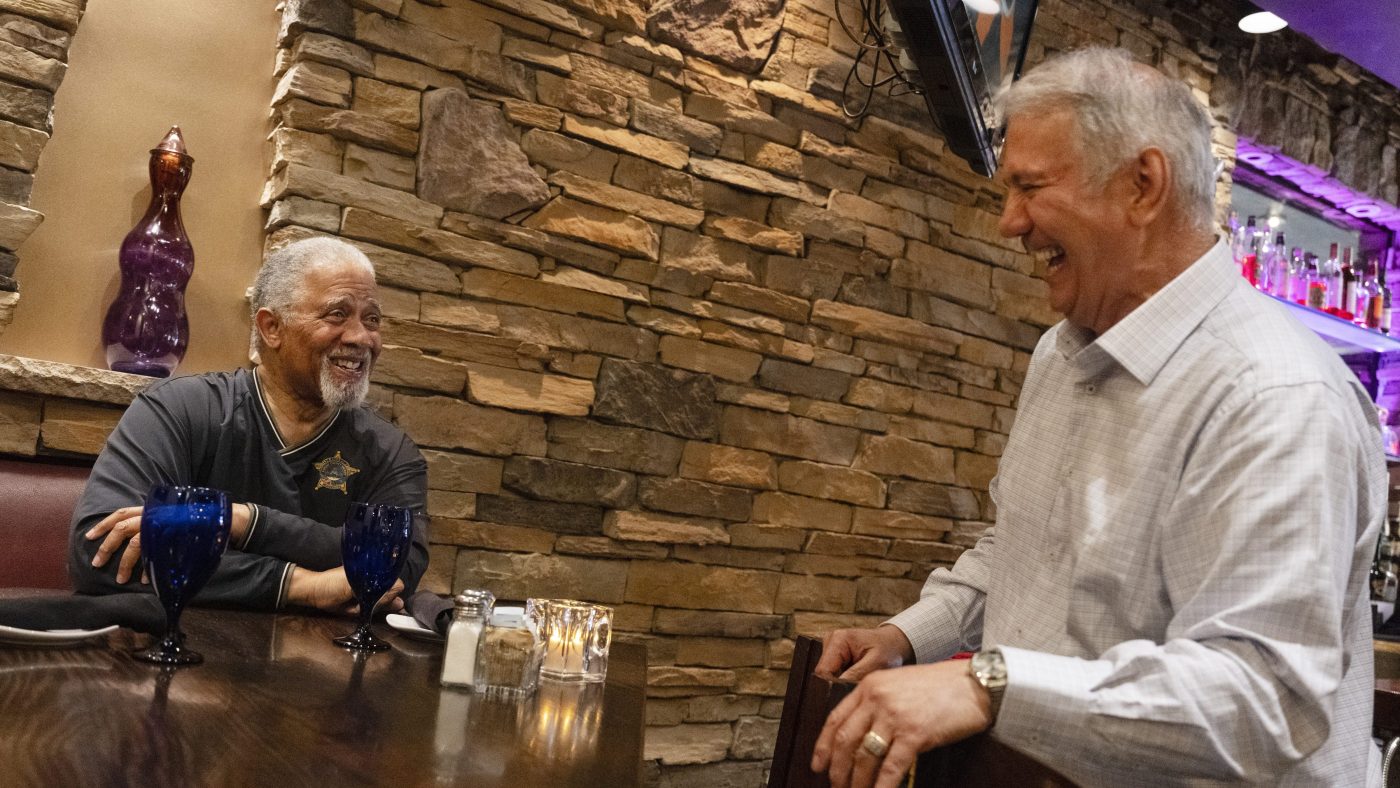
Bill Finney, ‘original ambassador of police-community relations,’ retiring as Ramsey County undersheriff
With children clamoring for treats near an ice cream truck in St. Paul, Bill Finney stepped out from an unmarked squad car, helped them make their selections and paid for them.
“This is what makes Bill Finney special,” Ramsey County Sheriff Bob Fletcher said of Finney’s deep-rooted community connections.
Finney’s last day at the Ramsey County Sheriff’s Office was Friday, his second time retiring in 20 years. In 2004, Finney left the St. Paul Police Department after 12 years as police chief — and most people still call him “Chief.”
Finney and Fletcher ran against each other for sheriff in 2006 — it was a politically contentious race and Finney narrowly lost. After Fletcher was voted out of office, he won election again in 2018 and convinced Finney to come to work for him.
“He’s the original ambassador of police-community relations,” Fletcher said. “… We both wanted to put the future of policing in the community ahead of any differences we had in the past.”
It’s been a challenging job. Finney was in charge of overseeing community relations at the sheriff’s office during a time of distrust in law enforcement. And the sheriff also asked Finney to step in to manage the county jail when some employees said they’d been discriminated against.
There have been lawsuits in recent years about conditions at the jail, and the Minnesota Department of Corrections ordered the jail to address overcrowding after an investigation showed staffing shortages led to delayed or denied medical treatment for inmates. The jail increased staffing and is in compliance with state requirements, according to DOC.
State’s first Black police chief
When Finney informed Fletcher he wasn’t going to renew his peace officer license, the sheriff reminded him that he didn’t need one to be in charge of the jail.
“I said, ‘Well, Linda Finney says it’s time for me to sit down,’” Bill Finney said of his wife. “And I’m 75½, that’s enough. … It’s been a long career.”
Finney grew up in St. Paul’s Rondo area. His family’s house was torn down when Interstate 94 was built through the neighborhood.
He started as a reserve officer in Mankato during his senior year at Mankato State College (now Minnesota State University, Mankato), from 1969 to 1970. Finney became a St. Paul police officer in 1971.
Former St. Paul Police Chief Bill Finney talks about his career in law enforcement. Finney retired in 2004 after 12 years as St. Paul Police Chief and is retiring again after serving as undersheriff for Ramsey County Sheriff Bob Fletcher. (John Autey / Pioneer Press)
“I never thought I’d be chief,” he said. “When I was young, all I wanted to do was be a homicide detective and the more I got into it, I said, ‘I think I want to supervise officers and manage them.’”
Finney said he wasn’t getting opportunities in the department to advance beyond his rank of captain. He decided to run for the St. Paul school board “because I had to show the outside world that I was more capable.” He won election and served on the school board for three years.
“The other thing that happened that made me very viable for police chief was Rodney King,” Finney said. King, who was Black, was beat by white officers in California and a jury found them not guilty in 1992. At a time of critical race relations, it was the right time for Minnesota — and St. Paul — to have its first Black police chief, Finney said.
Fletcher, who became a St. Paul officer in 1977, worked for Finney when he was police chief.
Building community relations at sheriff’s office
In the 2006 election for sheriff between incumbent Fletcher and former police chief Finney, there were plenty of personal and professional jabs. Fletcher won by just over 1,000 votes, narrowly missing the triggering of an automatic recount.
Then, during the 2010 sheriff’s race, former St. Paul Assistant Police Chief Matt Bostrom ousted Fletcher, who’d been sheriff for 16 years. Bostrom retired halfway through his second term as sheriff and Jack Serier, who was Bostrom’s second-in-command, was appointed to become sheriff in 2017.
One day, Finney, who is a cigar connoisseur, was at a private cigar club in Lilydale where he liked to go to read. He looked up and saw Fletcher walk in. “I knew Bob didn’t smoke cigars, so I said, ‘What’s up?’” Finney recalled.
Fletcher asked Finney if he was going to run for sheriff, and suggested they run against each other again. Finney said “no,” but told the former sheriff that, from everything he was hearing, Fletcher would win again if he ran.
“I said, ‘Everybody knows Fletcher. They like you or they can’t stand you, but everyone knows who you are,’ so name recognition is nine-tenths of it here,” Finney said recently.
Fletcher asked Finney if he’d come work for him if he became sheriff again.
After Fletcher was elected in November 2018, then-St. Paul Police Chief Todd Axtell — who worked with both Finney and Fletcher — also tried to convince Finney to go to work for the sheriff’s office.
“One thing is clear about Chief Finney: Public service runs through his veins,” Axtell said. “I just knew he wasn’t done being a public servant and he had a lot to give.”
Finney talked to his wife about working for Fletcher as an undersheriff. Linda Finney asked, “Well, why would you want to do that?” Bill Finney said. He told her, “He’s a different Bob Fletcher than the one I used to have conflict with.” Finney said he’d seen a softer side of Fletcher emerge.
Fletcher agrees. His 26-year-old son, Kyle, died of a drug overdose in 2015. He lost his sister-in-law to breast cancer. “Death has a way of giving you perspective,” Fletcher said. “… My evolution was also watching what was happening in the police world.”
Still, Finney pressed Fletcher, asking, “Why do you need me to come work with you?” Finney said the sheriff told him he wanted to work on building relationships with communities of color. Both men said Fletcher had solid connections with Asian and Somali communities, but not with the Black community.
Related Articles
Celebrity chef Justin Sutherland arrested on suspicion of domestic assault, threats of violence Friday
Lakeville police investigating suspected homicide in Amazon warehouse parking lot
Teen arrested after St. Paul homicide charged with felony gun possession
St. Paul man sentenced to nearly 20 years in prison for two sexual assaults five years apart
St. Paul man sentenced to nearly 14 years for killing West Side store worker
“You have to have good relationships, you have to know who the movers and shakers are in the communities,” Finney said. “They have to trust you and like you and believe that you’re doing your best and that you’re going to investigate anything that anybody has questions with. That’s what Bob wanted me to help with, and I was happy to do that.”
Finney and Fletcher hired community service officers, including people who have deep connections in the Black communities in St. Paul and the suburbs.
Tyrone Terrill, African American Leadership Council president, said Finney “did something that many people thought couldn’t be done, in terms of our reconnection to the Ramsey County sheriff’s department.”
“It’s the tremendous trust in him,” Terrill said of how Finney built connections. “Chief Finney was the drum major for justice and equality. The foundation is so good we know it’s going to continue, even with him gone.”
Managing the jail
When George Floyd was killed in 2020 and then-Minneapolis police officer Derek Chauvin was arrested, he was originally held in the Ramsey County jail.
Eight correctional officers who worked for the sheriff’s office filed a lawsuit, saying they were initially ordered to stay away from the floor where Chauvin was jailed. They said in their lawsuit they “were segregated and prevented from doing their jobs … solely because of the color of their skin.” Ramsey County reached a settlement of nearly $1.5 million with the officers.
Fletcher asked Finney to take over the jail’s management after the Chauvin incident in 2020. From his tenure at the police department, Finney had dealt with times of tension with personnel, so he said he took an approach of talking to the correctional officers, especially those who were unhappy.
The undersheriff had never worked on the correctional side — “I just took people to jail,” he said of his time as a police officer — and he promoted experienced Ramsey County Sheriff’s Office correctional officers as his top staff.
In 2021, a woman’s tibia was fractured and an artery was severed while she was jailed. She filed a federal lawsuit, alleging correctional officers used excessive force and that she wasn’t taken for medical treatment for 17 hours, which resulted in disfigurement to her leg. Ramsey County settled the suit for $3 million last year.
Finney said he was “really angry” when he found out about the woman’s condition and ordered she be taken to the hospital.
The FBI contacted the woman’s attorney, Richard Student, indicating they opened their own investigation. It’s since been closed and prosecution was declined, Student said of an update he received.
“It’s a difficult operation,” Fletcher said of booking 20,000 people a year into the jail. “We’re not perfect, but managing that imperfection is part of our job and Bill did a great job of managing the issues that would develop.”
Finney had the opportunity to hire correctional officers, and he said he was committed to recruiting more women. “It had been kind of a glass ceiling and I wanted to make sure that didn’t happen — if they earned it, they got it,” he said about promotions. The new undersheriff of the jail, Ashlee Bryant, is the first woman to run the Ramsey County jail, Fletcher said.
Finney also set out to hire more correctional officers who are people of color, to better reflect the jail’s population. “You have less conflict if they can look across and see there’s a jailer who looks like them,” Finney said.
Life after retirement
Finney’s wife, Linda, retired in 2006 as superintendent of the Minnesota Bureau of Criminal Apprehension; she was the first woman to run the agency. They enjoy taking cruises, and Bill said they’re looking forward to traveling more.
Finney used to be an avid motorcycle rider. Before he became undersheriff, he’d ride about 20,000 miles each summer, going from coast to coast.
Bill Finney laughs as he talks at the Downtowner Woodfire Grill in St. Paul. Finney, who retired in 2004 after 12 years as St. Paul Police Chief, retired again from his latest position at the Ramsey County Sheriff’s Office on Friday. (John Autey / Pioneer Press)
“There’s three or four old retired guys who ride with me,” Finney said. “They’d say, ‘Hey, let’s go to lunch. Where do you want to go to lunch? Let’s go to Maine, get some lobster.’ We’d tell our wives and off we’d go.”
But he’s only ridden about four times this year because his hip has been bothering him. He had his left hip replaced 12 years ago and his right hip is next.
He and Linda have grandchildren of varying ages, along with a great-grandchild now.
When Finney was police chief, he’d talk to academy classes as people were becoming St. Paul officers. He encouraged them to keep their friendships with people who weren’t officers, which he thinks is still good advice to keep them grounded.
“After awhile, you get a certain hardness about yourself and you think the world’s against you and only cops understand you,” Finney said. “I told them, ‘Go around the people who are your friends for life and hear how normal people, which is most everybody, view a certain situation. You need to hear that.’”
Related Articles
Prosecutors decline filing charges in death of woman at Hugo assisted-living center
St. Paul man dies in single-vehicle motorcycle crash in Como area
Motorcyclist, passenger die in collision with car in Blaine
St. Paul firefighter found, receiving treatment, after going missing from South St. Paul residence
After baby book stolen from vehicle in St. Paul, ‘miracle’ returns it to family


